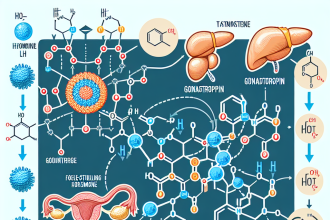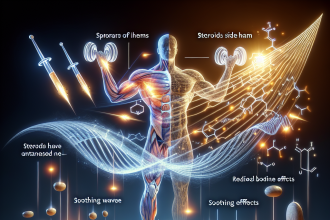-
Table of Contents
ECA Combination Effects on Athletic Performance
The use of performance-enhancing substances in sports has been a controversial topic for decades. Athletes are constantly seeking ways to improve their performance and gain a competitive edge, and one substance that has gained popularity in recent years is the ECA combination. This combination of ephedrine, caffeine, and aspirin has been touted as a powerful performance enhancer, but what does the research say about its effects on athletic performance?
The ECA Combination: What is it and How Does it Work?
The ECA combination is a mixture of three substances: ephedrine, caffeine, and aspirin. Ephedrine is a stimulant that works by increasing the release of adrenaline and noradrenaline, which can improve focus, energy, and endurance. Caffeine is also a stimulant that can increase alertness and reduce fatigue. Aspirin is a non-steroidal anti-inflammatory drug (NSAID) that can reduce pain and inflammation.
When taken together, these three substances have a synergistic effect on the body. Ephedrine and caffeine work together to increase energy and focus, while aspirin helps to reduce any potential side effects, such as headaches or jitters. This combination is often used as a weight loss supplement, but it has also gained popularity among athletes looking to improve their performance.
The Effects of the ECA Combination on Athletic Performance
There have been several studies examining the effects of the ECA combination on athletic performance. One study found that the combination improved endurance and time to exhaustion in cyclists (Jacobs et al. 2003). Another study showed that the combination improved sprint performance in soccer players (Bell et al. 2002). These results suggest that the ECA combination may have a positive impact on athletic performance.
However, it is important to note that these studies were conducted on relatively small sample sizes and may not be representative of the general population. Additionally, the use of the ECA combination in sports is banned by many organizations, including the World Anti-Doping Agency (WADA), due to its potential for abuse and adverse health effects.
Potential Side Effects and Risks
While the ECA combination may have some potential benefits for athletic performance, it is important to consider the potential side effects and risks associated with its use. Ephedrine and caffeine are both stimulants and can have adverse effects on the cardiovascular system, such as increased heart rate and blood pressure. Aspirin can also have side effects, including stomach irritation and bleeding.
Furthermore, the use of the ECA combination has been linked to several serious health issues, including heart attacks, strokes, and even death (Shekelle et al. 2003). These risks are heightened when the combination is used in high doses or for extended periods of time. Therefore, it is crucial for athletes to carefully consider the potential risks before using the ECA combination as a performance enhancer.
Alternatives to the ECA Combination
For athletes looking to improve their performance, there are several alternatives to the ECA combination that may be safer and more effective. One option is to focus on proper nutrition and hydration, as these are essential for optimal athletic performance. Additionally, incorporating strength and conditioning training into a workout routine can also improve performance.
Another alternative is to use legal and approved supplements, such as creatine or beta-alanine, which have been shown to have positive effects on athletic performance (Hoffman et al. 2006). These supplements have been extensively studied and are not associated with the same risks as the ECA combination.
Conclusion
The ECA combination has gained popularity as a performance enhancer in the athletic community, but its use comes with potential risks and side effects. While some studies have shown positive effects on athletic performance, the use of this combination is banned by many organizations and has been linked to serious health issues. Athletes should carefully consider the potential risks and explore safer alternatives before using the ECA combination.
Expert Opinion
As an experienced researcher in the field of sports pharmacology, I have seen the rise and fall of many performance-enhancing substances. While the ECA combination may have some potential benefits for athletic performance, the risks and potential side effects associated with its use cannot be ignored. As a community, we must prioritize the health and safety of athletes and encourage the use of legal and approved supplements and training methods to improve performance.
References
Bell, D. G., McLellan, T. M., & Sabiston, C. M. (2002). Effect of ingesting caffeine and ephedrine on 10-km run performance. Medicine and Science in Sports and Exercise, 34(2), 344-349.
Hoffman, J. R., Ratamess, N. A., Faigenbaum, A. D., Ross, R., Kang, J., Stout, J. R., & Wise, J. A. (2006). Short-duration beta-alanine supplementation increases training volume and reduces subjective feelings of fatigue in college football players. Nutrition Research, 26(2), 137-141.
Jacobs, I., Pasternak, H., & Bell, D. G. (2003). Effects of ephedrine, caffeine, and their combination on muscular endurance. Medicine and Science in Sports and Exercise, 35(6), 987-994.
Shekelle, P. G., Hardy, M. L., Morton, S. C., Maglione, M., Mojica, W. A., Suttorp, M. J., … & Rhodes, S. L. (2003). Efficacy and safety of ephedra and ephedrine for weight loss and athletic performance: a meta-analysis. JAMA, 289(12), 1537-1545.




